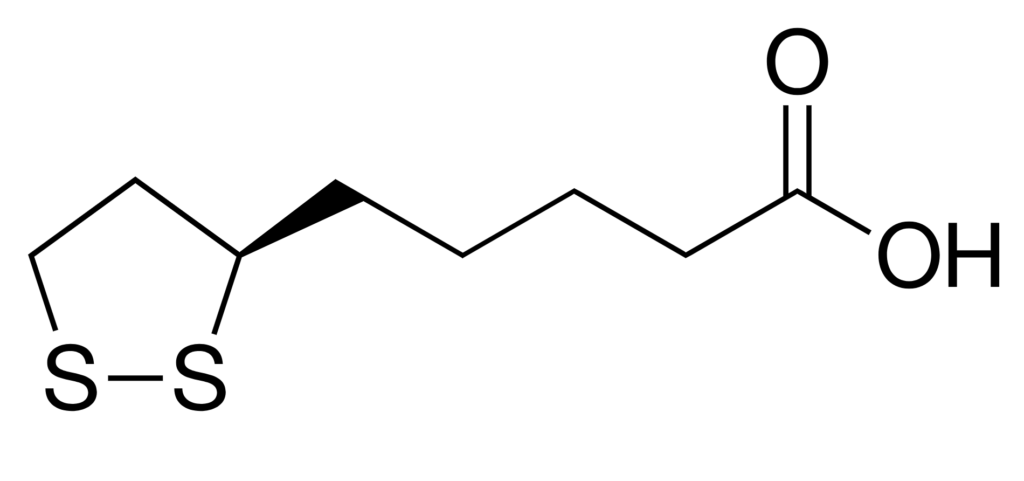Alpha-Lipoic Acid

Alpha-lipoic acid is a compound found in the body that facilitates in the process of energy production. The compound is also found in food in small quantities. One of the main functions of alpha-lipoic acid is acting as an antioxidant. As an antioxidant, alpha-lipoic acid has a distinct advantage: it is both fat and water soluble (Reed 1951). Unlike other antioxidants, this dual solubility allows alpha-lipoic acid to act within lipid-based (fat-based) cellular membranes and the water-based interior of the cell, providing broader antioxidant coverage throughout the body.
As a supplement evidence suggests that alpha-lipoic acid may be beneficial for a number of different conditions, including:
- Peripheral neuropathy
- Blood sugar control, diabetes and weight loss
- Mental Illness
- Toxicity
Alpha-Lipoic Acid and Diabetic Peripheral Neuropathy
Peripheral neuropathy is a condition where the longer nerves of the body have become damaged. It usually starts with weakness, pain, numbness and burning in the feet which can slowly spread up the body. It can also include the hands and arms. The condition is often caused by blood sugar elevations from diabetes that cause damage to the nerves over time. In severe cases, the symptoms can be debilitating, causing major reductions in a person’s quality of life.
While the results of the individual studies are somewhat mixed, an overarching review of the research on diabetic peripheral neuropathy found that lipoic acid significantly reduced symptoms (Cassanego 2022). Stabbing and burning pain, along with numbness and tingling were all reduced with lipoic acid treatment. The authors even conclude that alpha-lipoic acid should be used for treating painful diabetic peripheral neuropathy symptoms.
Alpha-Lipoic Acid, Blood Sugar Control, Diabetes and Weight Loss
Similar to studies on peripheral neuropathy, studies on alpha-lipoic acid and blood sugar control are also somewhat mixed. The most recent analysis suggests that alpha lipoic acid has significant benefits, although those benefits, on average, are quite modest.
In summary, supplementation of alpha-lipoic acid in diabetics was shown to reduce hemoglobin A1C (average blood sugar levels), body weight, inflammation, fasting blood sugar and triglycerides (Jibril 2022). On average, with dosing around 1200 mg per day, patients lost a couple of pounds of weight with lipoic acid. For blood sugar, the effects were just below what was considered clinically useful. In my own clinical experience, I have seen solid improvements in blood sugar levels in patients with diabetes and wouldn’t hesitate to consider using it as a potential treatment. However, if a patient didn’t seem to be getting benefits within a few months, I’d move on to other approaches.
Alpha Lipoic Acid and Mental Health
Depression
Patients with diabetes have a heightened risk for both peripheral neuropathy and depression. In one study, alpha lipoic acid was able to reduce the development of both conditions in diabetic patients (Karalis 2021). There was an almost 40% reduction in depression symptom scores over the eight months of treatment. Furthermore, the subjective symptoms of neuropathy decreased by 80% over the same timeframe.
A separate study in migraine patients also found improvements in mood with alpha-lipoic acid supplementation (Kelishadi 2021). After three months, depression and anxiety symptoms were both reduced by one-third.
On the flip side, a small trial on depressed patients with bipolar disorder did not find significant effects on mood with a combination of alpha-lipoic acid and acetyl-l-carnitine (Brennan 2013). However, this study shouldn’t be considered the last word as only 11 patients out of 20 completed the study in the treatment group.
Alpha-Lipoic Acid and Heavy Metal Toxicity
While not well explored in humans, a lot of preliminary data suggests that alpha-lipoic acid may protect from toxicants and toxicity. These effects are most likely due to the antioxidant benefits of alpha-lipoic acid and its chelating properties.
Alpha-lipoic acid can chelate, or bind up, a number of different metals, including manganese, zinc, lead, cadmium, nickel, iron, cobalt, arsenic and mercury (Patrick 2002). Chelation can help with mobilizing heavy metals out of the body. While the effects of alpha-lipoic acid are not as strong as standard drug treatments for metal toxicity, it still does appear to have significant effects.
However, animal studies also suggest that alpha-lipoic acid may redistribute metals within the body. High doses of mercury, cadmium and copper followed by alpha-lipoic acid were found to move the metals from the normal storage locations to other organs. Mercury levels were increased in the brain, cadmium increased in the kidneys and muscle tissues and copper was increased in all tissues except the liver (Patrick 2002). In cases where there are concerns for heavy metals, alpha-lipoic acid should be approached cautiously due to these redistribution-type effects.
Alpha-Lipoic Acid and Other Toxicants

Case reports in other types of poisoning also suggest benefits from the supplement. Death cap mushrooms are highly toxic. They are sometimes confused with edible mushroom varieties and consumed, typically with fatal results. A report from a treatment center found that 39 out of 40 patients were saved with intravenous alpha-lipoic acid to counteract death cap mushroom poisoning (Steyn 1966).
Animal studies have found benefits from alpha-lipoic acid in protecting from carbon tetrachloride poisoning and acetaminophen (Tylenol) overdose (Liu 2019, Abdel-Zher 2008). Other animal studies show that alpha-lipoic acid protects from pesticide exposures (Uchendu 2017). Interestingly, alpha-lipoic acid was even shown to provide benefits from brain toxicity in animals exposed to bisphenol A, a chemical found in some hard plastics and cash register receipts (Khan 2018).
Considering the large number of different types of poisoning that alpha-lipoic acid appears to protect against, additional research in humans would be warranted to better establish safety, appropriate dosing and benefits.
Conclusion
Alpha-lipoic acid is an interesting compound with strong antioxidant properties. Research suggests benefits for peripheral neuropathy, with modest effects on blood sugar and weight loss. Depression may also benefit from alpha-lipoic acid, but more studies could help to better understand its mental health benefits. Finally, alpha-lipoic acid appears to protect from numerous types of toxicants, with human case studies reversing amanita mushroom poisoning.



